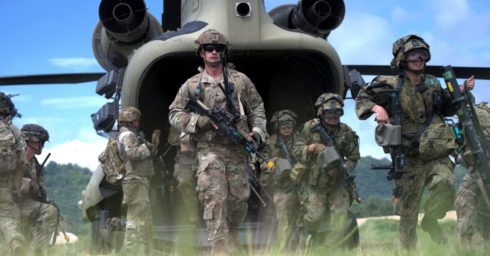At least five U.S. personnel were injured when two Katyusha rockets targeted the Ain al-Assad airbase in western Iraq. This incident, which occurred on Monday, has heightened tensions in the region, already strained due to recent high-profile assassinations. Iraqi security sources confirmed that the rockets landed within the base, causing injuries among the U.S. military personnel stationed there. According to U.S. officials, one of the Americans sustained serious injuries, while the total number of affected individuals might be as high as seven, including both military personnel and civilians.
The White House quickly responded, stating that President Joe Biden and Vice President Kamala Harris had been briefed on the attack. A U.S. official, speaking anonymously to Reuters, mentioned that base personnel were conducting a post-attack damage assessment. This attack follows last week’s assassination of senior figures from Hamas and Hezbollah, which has escalated tensions across the Middle East.
Rising Tensions and Potential Retaliation
The rocket attack comes amid threats of retaliation from Iran following the killing of Ismail Haniyeh, the political leader of Hamas, in Tehran last week. Iran has accused Israel of the assassination, although Israel has not officially claimed responsibility. In a related incident, an Israeli strike on Beirut resulted in the death of Fuad Shukir, a senior commander of Hezbollah. The confluence of these events has led to an increase in hostilities, with Iran vowing to respond.
The U.S. has been closely monitoring Iran’s reactions to these incidents. In anticipation of possible retaliatory attacks, the U.S. has deployed additional military forces to the Middle East, describing these measures as defensive. This proactive approach underscores the heightened state of alert and the potential for further conflict in the region.
U.S. and Israeli Defense Coordination
In light of the recent attacks, U.S. Secretary of Defense Lloyd Austin and Israeli Minister of Defence Yoav Gallant held a call on Monday to discuss the situation. According to a Pentagon readout, both defense leaders agreed that the rocket attack on Ain al-Assad airbase marked “a dangerous escalation.” This dialogue underscores the close defense coordination between the U.S. and Israel amid growing threats in the region.
Last week, the U.S. conducted a strike in Iraq against individuals it identified as militants preparing to launch drones, which were deemed a threat to U.S. and coalition forces. This preemptive strike is part of a broader strategy to mitigate risks posed by various militant groups aligned with Tehran. The ongoing conflict between Israel and Hamas, which has lasted nearly ten months, continues to generate low-level hostilities involving Iran, Hezbollah, and other regional actors. While an all-out war remains unlikely, the increasing tensions raise the risk of significant conflict.
Iraq’s Role Amidst Escalating Conflict
Iraq, a rare ally to both the U.S. and Iran, finds itself in a precarious position amidst the escalating conflict. The country hosts approximately 2,500 U.S. soldiers and numerous Iran-backed fighter groups integrated into its security forces. The geopolitical dynamics in Iraq are further complicated by the regular tit-for-tat attacks that have erupted since the Gaza conflict began in October. These skirmishes underscore Iraq’s volatile security landscape, where both American and Iranian interests intersect.
The Ain al-Assad airbase, a significant site for U.S. military operations in Iraq, has been targeted in the past, reflecting its strategic importance. The base’s vulnerability highlights the broader security challenges faced by U.S. forces in the region, particularly as they navigate the complex web of alliances and hostilities. The recent attack not only endangers U.S. personnel but also underscores the broader risks to stability in Iraq and the region.
Implications for Regional Stability
The increasing frequency of attacks and retaliatory threats in Iraq points to a troubling trend of instability. As the U.S. and its allies bolster their defenses, the potential for miscalculation or unintended escalation grows. Iraq’s role as a battleground for proxy conflicts between the U.S. and Iran places it at the center of regional power struggles. The presence of both American and Iranian interests in Iraq makes it a critical flashpoint, where local incidents can quickly escalate into broader conflicts.
The U.S. deployment of additional forces to the Middle East, while intended as a deterrent, also serves as a reminder of the fragile security situation. Iraq’s government faces the daunting task of balancing its relationships with both the U.S. and Iran while maintaining domestic stability. The ongoing conflict in Gaza, combined with the recent high-profile assassinations, adds layers of complexity to an already volatile situation.














